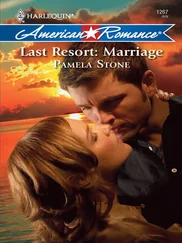Dressed, she descended the stairs, glancing out the window again. Wilkie was not on his way back from the beach now, she saw. He was here already, standing by the gate in his swim trunks, talking to Barbie Mumpson, who stood close to him, looking up with the worshipful expression common to Wilkie’s fans.
But as Jenny began to turn away from this familiar sight, something unfamiliar happened. Barbie stood on tiptoe, flung her arms around Wilkie, and kissed him full on the mouth. Occasionally in the past Jenny had seen overeager women try to do this, and her husband’s reaction had always been a speedy though polite flinch of withdrawal. But now Wilkie did not withdraw; he might even have joined in, though it was hard to be sure. He just went on standing there.
And maybe nothing unfamiliar has happened, Jenny thought as Barbie finally let go of her husband: nothing that hasn’t happened before. Maybe that’s why Wilkie’s been so strange lately, so distant. Maybe when he said last year that they were getting older, it was her age he was speaking of, not his own. He meant that Jenny no longer interested him romantically, that he wanted someone younger. Well, I’m not interested in you either, Jenny thought. I hate you.
Meanwhile Wilkie was still standing close to Barbie Mumpson, gazing dumbly at her. But soon probably he would come into the house and pass Jenny with the same quick, chilly, distant glance he had thrown in her direction when he left for his swim.
She couldn’t bear that, not now. Turning away, Jenny ran across the room, out through the sliding glass doors, toward Gerry’s apartment.
An hour earlier, fleeing his wife and his house, Wilkie Walker had hastened along the cracked sidewalk toward the ocean. He breathed heavily, and his heart thudded as if he had narrowly escaped some disaster. No, two disasters. When Jenny’d looked at him and laid her soft hand on his arm and said, so lightly but so longingly, that she’d like to come swimming with him, Wilkie had been shaken by two almost uncontrollable, irreconcilable impulses: first, to embrace her and cry “Save me!” and then to shove her away, shouting “Leave me alone, get your hands off me!” Just barely, he had resisted and escaped.
He kept twisting round, looking back every few moments to see if by some dark chance Jenny had scrambled into her bathing suit and was following him. That would be fatal—no, anti-fatal—because even if he was in the water first he wouldn’t be able to carry out his plan. He couldn’t disappear with his wife gazing after him, swimming after him, calling him to come back, crying aloud that he was out too far—But that’s just what Jenny would do if he refused to hear and plunged on. It would probably end with his having to save her, because though graceful in the water, she was not a strong swimmer.
Again Wilkie glanced over his shoulder. The street, blood-spattered with the wet crimson petals of bougainvillea, was still empty. Perhaps Jenny wasn’t coming. Perhaps this time he would make it. He hurried on.
Now the ocean opened up ahead. The sun was low in the sky, a flat, pale orange; it wouldn’t be long to sunset. Conditions were ideal: a strong wind blew from the south, the tide was high, and the sea was streaked with irregular, rocking clumps of creamy camouflaging foam.
Wilkie passed—for the last time, he hoped—the list of Higgs Beach Regulations. Deliberately he strode across the rough sand to the pier, ignoring the people gathered there. At the far end he dropped his sandals, shirt, and towel onto the boards. He descended the wet stairs, holding tightly to the salt-slimed wooden railing as the waves sloshed against him. He must not slip now and merely injure himself.
The sea, after a week of rain, was cool, almost cold. Wilkie stroked strongly away from the pier, then paused, treading water and watching the sun slide into its slot between sky and sea, waiting for the sunset-gawkers to disperse, for the air to flush from gold to gray for the last time. The horizon, almost to the zenith, was piled with thunderclouds, possibly signaling imminent rain. That was good; a sudden storm would make his drowning more plausible.
Soon only five people remained on the pier: a teenager down near the beach, plugged into a Walkman; a late-middle-aged couple near him; and at the far end a man in an electric-powered wheelchair and his slight, black-haired Chinese (or possibly Japanese) attendant. Wilkie had seen this pair before: almost every day, before the weather changed, they had been here at sunset. The invalid was young, painfully thin, and breathed through a tube. According to Molly Hopkins, he was probably one of the many AIDS victims who came to die in Key West. At the end of their lives they returned to the place where they had once been happiest—and where, quite possibly, they had been infected and infected others.
As Wilkie waited, fending off the small, choppy waves, the Asian attendant came round in front of the chair and leaned over the invalid. They gazed steadily at each other and appeared to speak. Then the attendant bent down, moved the breathing tube aside, put his hands on the other’s shoulders, and kissed him passionately. At last he replaced the tube, stood up, and started back down the pier toward the van in which they always traveled, stumbling once or twice as if blinded.
Wilkie, embarrassed by this scene, turned away. For a moment he continued to tread water, watching the fading red light on the outer sea, resenting the delay, resenting the presence of the dying man. The sun was gone, the rose-colored clouds were fading; why the hell didn’t they leave? Wilkie frowned: though no one would ever know, it displeased him to realize that the last strong emotions of his life had been irritation and distaste. Shaking his head, he struck out for the darkening horizon.
Almost at once there was a loud, heavy, explosive splash in the water behind him. Wilkie stopped swimming and looked round. The pier was empty except for the three tourists near shore. The sick man in the wheelchair had disappeared as if wiped off the sunset with a sponge.
The tourists had heard the splash too: they were scrambling to their feet, shouting, running out along the pier, then huddling together and staring into the water on the far side. One of them waved and screamed something unintelligible at Wilkie.
His first reaction was pure black rage. Goddamn it, why did that have to happen now? Then, automatically, he started swimming hard toward the pier.
That wasn’t an accident, he thought suddenly as he clung to the soggy railing and began to haul himself up. That was a suicide, deliberately and courageously planned. It was high tide, and a heavy wheelchair with a man strapped into it would go—had gone—straight to the rocky bottom in ten or twelve feet of sea water. Four minutes, that was the longest anyone could live without air, and this fellow wasn’t anyone, he was fatally ill.
Down by the beach the invalid’s Asian attendant—no, lover, Wilkie realized—began to run toward them, shouting. I saw them say good-bye, he thought. I saw their last kiss. He clung to the slimy steps, above which the tourists stood now, jabbering and pointing. Witnesses, he thought, on hand to prove that the other fellow—the lover—wasn’t physically involved in this death. And I also am a witness.
We won’t be able to get him up, and it’s not what he wanted; but we have to seem to try, Wilkie told himself as the teenager and the Asian descended the wet stairs. And it’ll be a nasty, hopeless business. Meanwhile, the two middle-aged tourists pounded back along the wooden walkway, probably to call the police.
The next fifteen minutes, as Wilkie had foreseen, were highly disagreeable. With great difficulty, he and the other two men splashed and forced their way through the rusted, barnacle-encrusted supports of the pier. The wet, rubbery, floating seaweed, and the high surf, made it hard for them to reach the heavy wheelchair; the fading light prevented them from seeing it clearly. The third time Wilkie dove, he half grasped something bony and limp that must have been an arm, then lost it. Soon he had a pain in his hip and a long bleeding scrape on his shoulder.
Читать дальше












